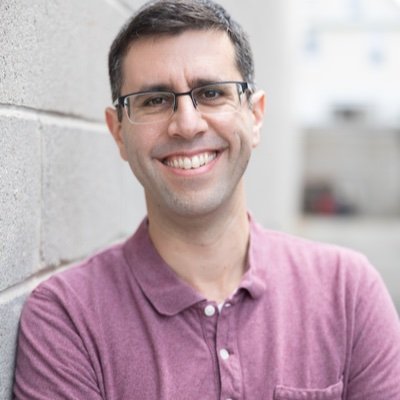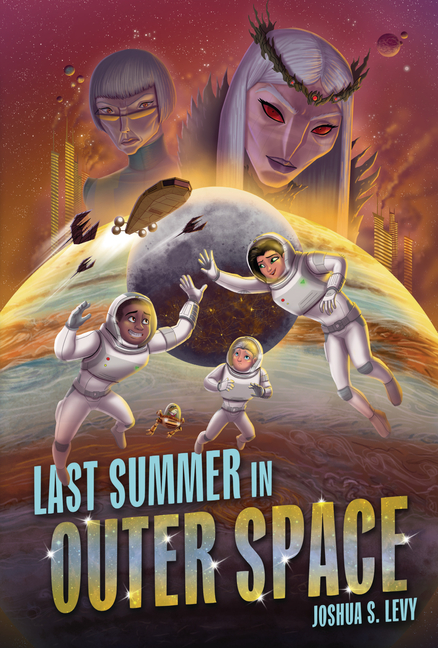From Teaching to Writing

TeachingBooks asks each author or illustrator to reflect on their journey from teaching to writing. Enjoy the following from Joshua S. Levy.
The New Chair
by Joshua S. Levy
Back when I was a teacher (I confess, I’m not in the classroom anymore), there was a small moment that unlocked both teaching and writing for me: The day we got a new chair. Yes, one single new (and by “new,” I mean “not broken”) chair.
And the kids. went. wild.
It wasn’t a classroom of glistening perfect chairs, you see. Many were scratched up or wobbly or (heaven help us) squeaky. One chair finally gave way and collapsed, replaced by The New Chair. And everyone wanted it. Grabbing. Screaming. “But I want the new chair.” “No, I want it.”
I can’t quite remember how we solved this particular problem. A lottery, maybe? Sign-up sheet? Epic high stakes game of musical chairs?
But that’s not the point. The point is that this moment was so suddenly chaotic and stressful and funny and weird and real. And I knew that this was how my own books should feel.
There’s a temptation in writing—particularly science fiction or fantasy writing—to focus a bit too much on the world and not enough on the characters. It’s a temptation I certainly felt when I was starting out and one that I hadn’t done enough to fight. Until The New Chair. That moment (among others in the classroom) helped crystalize for me the centrality of character even in speculative storytelling. The world out there is important, of course. But never at the expense of how it feels in here. And if I wanted to write about kids on an adventure, lost in space, they had to be the same kinds of kids I was teaching here on earth. Chaotic. Stressful. Funny. Weird. And real.
What came out the other side of that realization was Seventh Grade vs. the Galaxy (Lerner, 2019), the first in my Adventures of the PSS 118 series, which just concluded in August with Last Summer in Outer Space (Lerner, 2023). In the books, the kids attend a “Public School Spaceship” (with a snarky AI personality) that gets lost across the galaxy. At one point early on, the main characters—Jack, Becka, and Ari—find themselves alone on the bridge of the ship. Their classmates are gone. Their teachers are gone. It’s up to the trio to bring everyone home.
And what do they do?
They fight over who gets to sit in the empty captain’s chair—because of course that’s what they do.
The question—What would the kids do/think/say if put in some extraordinary situation?—is at the heart of much of my writing. And, when I was still teaching, it’s what I encouraged my own students to channel in their writing. (And it’s part of what I discuss in school visits today.)
What would kids like you do/think/say if put in some extraordinary situation?
Yes, setting is important. (I’m proud to have a discussion guide for the books that explores some of the real astronomy behind the kids’ adventures.) And worldbuilding can be an absolutely blast. But it’s never as critical as character building. That’s been the case for me as an author and a teacher.
Asking kids—and myself—how folks are likely to eat food on a school spaceship (on the PSS 118, mostly via a mix of 3D printers and cranky lunch robots) is an important question. But so is what the kids eat, particularly what they want to eat. (For Jack, ice cream NO RAISINS.)
Asking how gravity works on the ship (the teachers can turn it on and off at will) is an important question. But so is what the kids do with it, particularly what they want to do with it. (Play zero-g dodgeball, mostly. Although low-g basketball is fun too.)
At every turn, us writers need to ask ourselves: What is this world like and how do the people in it go about that world? These are critical questions for my own books, and—when working to help kids elevate their own writing—critical for students too
Books and Resources

TeachingBooks personalizes connections to books and authors. Enjoy the following on Joshua S. Levy and the books he’s created.
Listen to Joshua S. Levy talking with TeachingBooks about the backstory for writing Last Summer in Outer Space. You can click the player below or experience the recording on TeachingBooks, where you can read along as you listen, and also translate the text to another language.
- Listen to Joshua S. Levy pronounce his name
- Enjoy this discussion guide for Adventures of the PSS 118 series
- Discover Joshua S. Levy’s page and books on TeachingBooks
- Visit Joshua S. Levy on his website, Twitter, Instagram, YouTube, LinkedIn, and his GoodReads page.
Explore all of the For Teachers, By Teachers blog posts.
Special thanks to Joshua S. Levy and Lerner for their support of this post. All text and images are courtesy of Joshua S. Levy and Lerner and may not be used without expressed written consent.



Leave a Reply